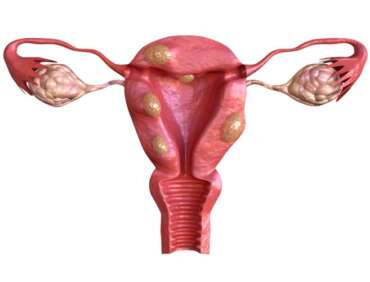
Many women hear the word “fibroids” for the first time when they start planning a pregnancy. The idea can feel scary — can fibroids stop you from conceiving or carrying a baby safely? The answer isn’t simple, because the link between fibroids and fertility depends on many factors, including the size, number, and location of the fibroids.
Let’s understand how fibroids affect fertility, pregnancy, and what treatment options can help you plan your journey to motherhood with confidence.
What Are Fibroids?
Fibroids, or uterine leiomyomas, are non-cancerous growths that form in the wall of the uterus. They’re made up of smooth muscle and connective tissue, and they can range from tiny, pea-sized nodules to large masses that distort the shape of the uterus.
It’s estimated that nearly 70–80% of women will develop fibroids at some point in their lives, though many never realize it because fibroids often cause no symptoms. For some women, however, fibroids can cause heavy periods, pelvic pain, bloating, and sometimes trouble conceiving — making fibroids and fertility a concern worth understanding.
Types of Fibroids That Affect Fertility
Fibroids are categorized based on where they grow in the uterus, and that location determines how much they might influence fertility:
1. Submucosal fibroids – These grow inside the uterine cavity and are most likely to affect conception. They can distort the uterine lining, making it harder for an embryo to implant.
2. Intramural fibroids – Found within the muscular wall of the uterus, they can change its shape or affect blood flow, sometimes interfering with embryo implantation or early pregnancy.
3. Subserosal fibroids – These develop on the outer wall of the uterus and usually don’t impact fertility directly unless they grow very large.
Knowing the type of fibroid you have helps your gynecologist create a personalized fertility plan.
How Fibroids Affect Fertility
Not all fibroids cause problems. Many women with fibroids conceive naturally. However, depending on their size and position, fibroids can create challenges like:
1. Difficulty with Embryo Implantation
Fibroids inside the uterine cavity can prevent a fertilized egg from attaching properly to the uterine lining. The distortion and poor blood supply can reduce the chances of successful implantation.
2. Blocked Fallopian Tubes
Larger fibroids can block the passage of sperm or the egg by pressing on the fallopian tubes, especially if located near the upper part of the uterus.
3. Hormonal Imbalance
Fibroids are sensitive to estrogen and progesterone. Hormonal disruptions caused by fibroids may affect ovulation and endometrial receptivity — key elements in conception.
4. Increased Inflammation
Fibroids can alter the uterine environment by triggering inflammation, which can interfere with embryo development or cause early miscarriages.
Fibroids and Pregnancy
Even if conception occurs, fibroids can sometimes complicate pregnancy. They may increase the risk of:
> Pain and cramping during pregnancy
> Bleeding or spotting in early pregnancy
> Preterm labor or delivery
> Fetal malpresentation (baby not in head-down position)
> Cesarean delivery, if fibroids obstruct the birth canal
That said, many women with fibroids still go on to have healthy pregnancies. Regular prenatal monitoring helps your doctor track fibroid growth and manage any complications early.

When to Suspect Fibroids Are Affecting Fertility
If you’ve been trying to conceive for more than six months (if over 35) or a year (if under 35) without success, it’s worth checking for fibroids. Some symptoms to watch for include:
> Heavy or prolonged menstrual bleeding
> Pelvic pain or pressure
> Frequent urination or constipation
> Bloating or abdominal fullness
Your doctor may recommend imaging tests like an ultrasound, hysterosonogram, or MRI to locate and assess fibroids. Sometimes, a hysteroscopy — inserting a tiny camera into the uterus — gives a direct view of fibroids affecting the uterine cavity.
Treatment Options to Improve Fertility
The treatment approach depends on your symptoms, age, and future pregnancy plans. Thankfully, several safe and effective options exist for managing fibroids and fertility concerns.
1. Watchful Waiting
If your fibroids are small and not causing symptoms, your doctor may recommend regular monitoring rather than immediate treatment.
2. Medication
Hormonal medications like GnRH agonists can shrink fibroids temporarily by lowering estrogen levels. They are sometimes used before surgery or fertility treatments but aren’t a long-term solution.
3. Myomectomy (Fibroid Removal Surgery)
This is the most effective treatment for women who want to preserve fertility.
> Hysteroscopic myomectomy: For fibroids inside the uterus.
> Laparoscopic or open myomectomy: For larger or multiple fibroids within the uterine wall.
After recovery, many women experience improved fertility and higher pregnancy success rates.
4. Uterine Artery Embolization (UAE)
This minimally invasive procedure blocks the blood supply to fibroids, causing them to shrink. However, it’s generally not recommended for women planning to conceive, as it may affect uterine function.
5. Lifestyle and Natural Support
Maintaining a healthy weight, managing stress, and eating a diet rich in fruits, vegetables, and whole grains can help balance hormones. Regular exercise and reduced alcohol and caffeine intake may also slow fibroid growth.
Fibroids and Assisted Fertility Treatments
For some women, even after fibroid removal, natural conception may be challenging. In such cases, assisted reproductive technologies (ART) like IVF (in vitro fertilization) may be an option. Studies show that removing cavity-distorting fibroids before IVF improves implantation and pregnancy outcomes.
Your fertility specialist will tailor your treatment plan based on your uterine health, age, and other fertility factors.
Can You Get Pregnant with Fibroids?
Yes — many women with fibroids conceive and carry healthy pregnancies. The key is understanding your body and working closely with a trusted gynecologist or fertility expert.
If you have been diagnosed with fibroids, don’t panic. Most fibroids are manageable, and treatment success rates are high. With the right medical care, many women overcome fibroids and fertility challenges to achieve their dream of motherhood.
Final Thoughts
Fibroids are common, but they don’t have to define your fertility journey. Early diagnosis, personalized treatment, and a holistic approach to reproductive health can make all the difference.
By learning more about fibroids and fertility, you empower yourself to make informed choices and seek the care you need. Whether through lifestyle changes, medical management, or surgery, you have options — and hope.
Remember, every woman’s story is unique. With the right support and timely intervention, fibroids don’t have to stand in the way of your plans for a family.
Key takeaway:
Understanding fibroids and fertility helps you make confident, informed decisions. With proper treatment and expert care, most women with fibroids can achieve successful pregnancies and healthy outcomes.

